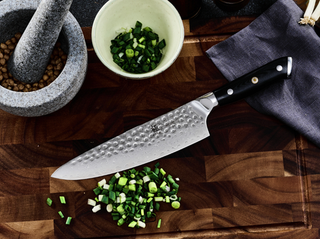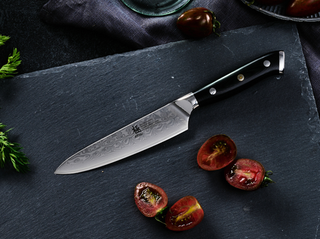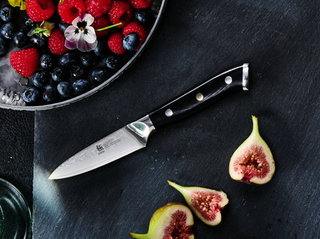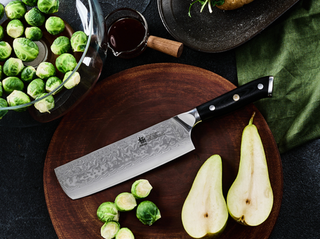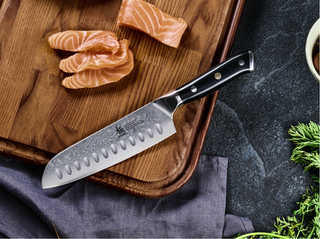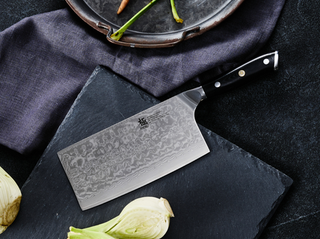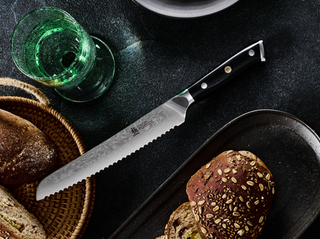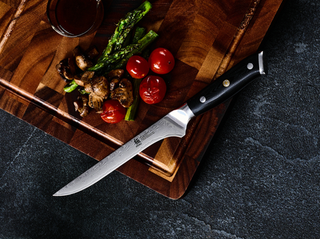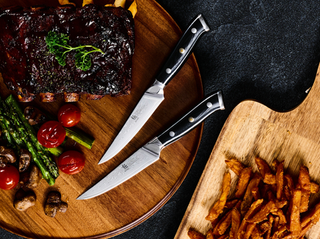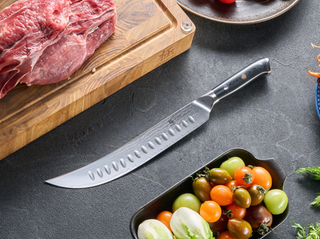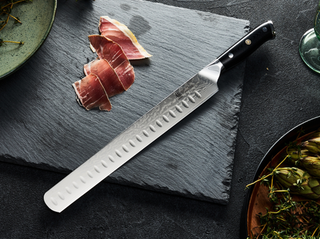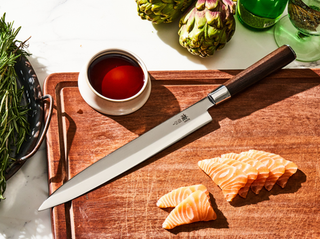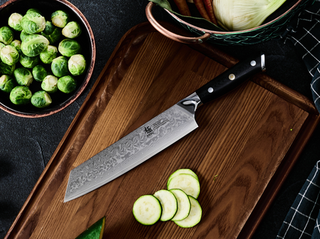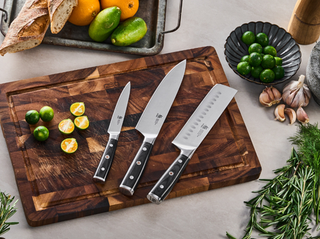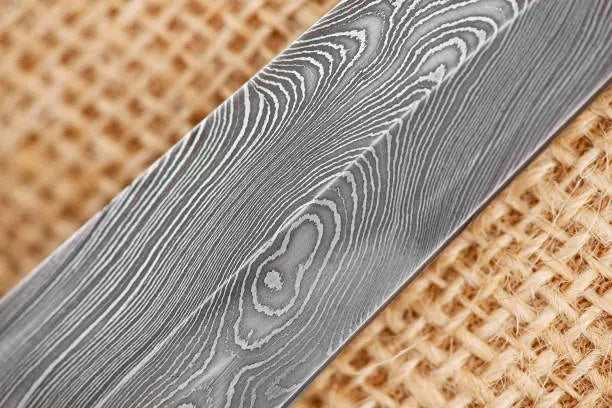Damascus steel is a type of patterned steel with visible layers that create beautiful swirling or wavy designs. Today, there are two main types of steel called "Damascus":
- Modern Damascus (Pattern-Welded Steel) - This is what you'll find in most Damascus knives today. It's made by layering different types of steel together, folding them, and then acid-etching the surface to reveal the pattern.
- Historical Wootz Damascus - The original Damascus steel was a special type of high-carbon crucible steel from India around the 5th century BC. It had natural patterns from carbide formations in the steel.
Most Damascus steel knives you can buy today are the modern pattern-welded type, not the historical Wootz steel.
But are they actually good knives?
This guide explains everything you need to know about Damascus steel, from what it is to whether you should buy it.
Is Damascus Steel Good For Knives?

Yes, Damascus steel can make excellent knives, but not necessarily because of the Damascus pattern itself.
The quality of a Damascus knife depends on the specific steels used to make it. Good Damascus blades combine steels with complementary properties – usually a hard steel for edge retention paired with a tougher, more flexible steel for durability.
High-quality Damascus knives perform just as well as solid steel knives of similar quality. However, some cheap "Damascus-style" knives just have patterns etched onto the surface without the actual layered construction.
What Is Damascus Steel Made Of?
Modern Damascus steel is typically made from two or more different steel types:
- The most common combination is 1084 or 1095 high-carbon steel with 15N20 high-nickel steel
- Higher-end knives might use premium steels like AEB-L, 52100, or even powdered steels
- The different steels must be compatible for forge welding
- Most Damascus blades contain between 67-300 layers
Each combination creates different performance characteristics and visual patterns. The nickel content in one of the steels creates the bright, silvery layers in the pattern.
Types of Damascus Steel Patterns
Damascus steel comes in several distinctive pattern types:
Random Pattern
This flowing, organic pattern forms naturally during forging. It's common in high-end Japanese kitchen knives and has a subtle, elegant appearance.
Twist Pattern
Created by twisting the steel billet during forging, resulting in a star-like or spiral pattern. This dramatic look is popular in hunting and outdoor knives.
Ladder Pattern
Made by creating alternating grooves on opposite sides of the steel bar, creating stacked waves when ground flat. This technique creates clear, defined patterns.
Raindrop Pattern
Created by making dimples in the steel that form circular patterns resembling raindrops when ground flat. This is one of the most distinctive Damascus patterns.
More complex patterns like mosaics combine multiple techniques to create intricate designs, but these are mostly found in custom, handmade knives.
Is Damascus Steel Better Than Regular Steel?
Damascus steel isn't necessarily better than modern solid steels in performance. Here's the truth:
- Edge Retention: Modern single steels like S35VN or M390 typically outperform Damascus in edge retention
- Toughness: Damascus can offer good toughness if it combines complementary steels
- Corrosion Resistance: Depends entirely on the steels used - Damascus using stainless steels will resist corrosion better
- Beauty: This is where Damascus truly excels - the patterns are unique and visually striking
The main reason to choose Damascus is for its beauty and craftsmanship, not necessarily superior performance. Many knife experts agree that the visual appeal is the primary selling point of modern Damascus steel.
Are Damascus Knives Worth It?

Whether Damascus knives are worth the higher price depends on what you value:
Reasons to Buy Damascus Knives:
- You appreciate the unique visual aesthetics
- You value craftsmanship and traditional techniques
- You want a conversation piece or display knife
- You're looking for a special gift
Reasons to Skip Damascus Knives:
- You prioritize pure performance over looks
- You have a limited budget
- You need extremely specific performance characteristics
- You prefer low-maintenance knives
A quality Damascus knife typically costs 50-100% more than a comparable solid steel knife. You're paying for the additional craftsmanship, time, and skill required to create the Damascus pattern.
How to Care for Damascus Steel Knives
Damascus steel requires some special care, especially if it contains carbon steel layers:
- Clean and dry thoroughly after each use - don't leave it wet or dirty
- Hand wash only - never put Damascus knives in the dishwasher
- Apply a light coat of mineral oil occasionally to protect the pattern and prevent rust
- Store properly in a knife block, magnetic strip, or blade guard
- Avoid cutting acidic foods for extended periods without cleaning
With proper care, a Damascus knife will maintain its beautiful pattern and performance for generations.
Real vs. Fake Damascus Steel
Not all knives labeled as "Damascus" are genuine pattern-welded steel. Here's how to spot fake Damascus:
Real Damascus:
- Pattern goes completely through the blade (visible on the spine and edge)
- Pattern is three-dimensional and has depth
- Each knife has slight variations in pattern
- Made by reputable manufacturers who disclose the steel types used
Fake Damascus:
- Pattern is only surface-deep and doesn't reach the edge
- Pattern looks printed or acid-etched onto the surface
- All knives have identical patterns
- Suspiciously low prices (quality Damascus knives start around $100)
Many extremely cheap "Damascus" knives from unknown brands are simply etched with acid to mimic the Damascus look without the actual layered construction.
Best Damascus Steel for Knives
The best Damascus steel combinations for knives depend on your intended use:
For Kitchen Knives:
- AEB-L/15N20 for excellent edge retention and stainless properties
- VG-10 core with Damascus cladding for easier maintenance
For Outdoor/Hunting Knives:
- 1095/15N20 for toughness and edge retention
- 52100/15N20 for excellent wear resistance
For Pocket Knives:
- Damasteel (powder Damascus) for premium performance
- 1084/15N20 for good all-around performance
Japanese knife makers often create some of the finest Damascus kitchen knives, combining traditional patterns with excellent heat treatment for superior performance.
Conclusion: Is Damascus Steel Right For You?

Damascus steel knives offer a perfect blend of artistry and function. While they don't necessarily outperform the best modern steels, they provide solid performance with unmatched beauty. The distinctive patterns make each knife unique and special.
If you appreciate craftsmanship and want a knife that's both a tool and a work of art, Damascus steel is definitely worth considering. For those who want the best of both worlds - stunning looks and premium performance - explore our collection of Japanese Damascus knives at Kyoku Knives, where traditional craftsmanship meets modern performance.
Remember, the best knife is the one that brings you joy when you use it - whether that's a simple solid steel blade or an intricate Damascus pattern with hundreds of layers.
Frequently Asked Questions (FAQ)
What exactly is Damascus steel?
Damascus steel refers to layered steel created by forge-welding different types of steel together, producing distinctive flowing or wavy patterns. Modern Damascus is pattern-welded steel, different from the original ancient Wootz Damascus made in India.
Are Damascus steel knives better than regular steel knives?
Damascus knives are prized mainly for their unique aesthetics and blend of steel properties. Their performance depends on the steels used—they can offer excellent sharpness and toughness—but they are not always superior to top-tier single-steel blades in edge retention.
How can I tell if a Damascus knife is genuine?
Authentic Damascus steel has patterns that run through the entire blade, visible at the edge and spine, with a three-dimensional depth and natural variation from piece to piece. Fake Damascus often has surface-only etched patterns that look identical across knives.
Is it possible to make Damascus steel knives at home?
Creating quality Damascus steel requires specialized forge-welding skills and equipment. Due to the complexity and safety risks, it’s not recommended to attempt making Damascus steel knives without proper expertise and facilities.
What types of applications are Damascus steel knives best suited for?
Different steel combinations cater to different needs: kitchen Damascus knives often use combinations like AEB-L or VG-10 for sharpness and corrosion resistance; outdoor and hunting knives favor tougher high-carbon blends; and pocket knives may utilize powdered Damascus steels for premium performance.
